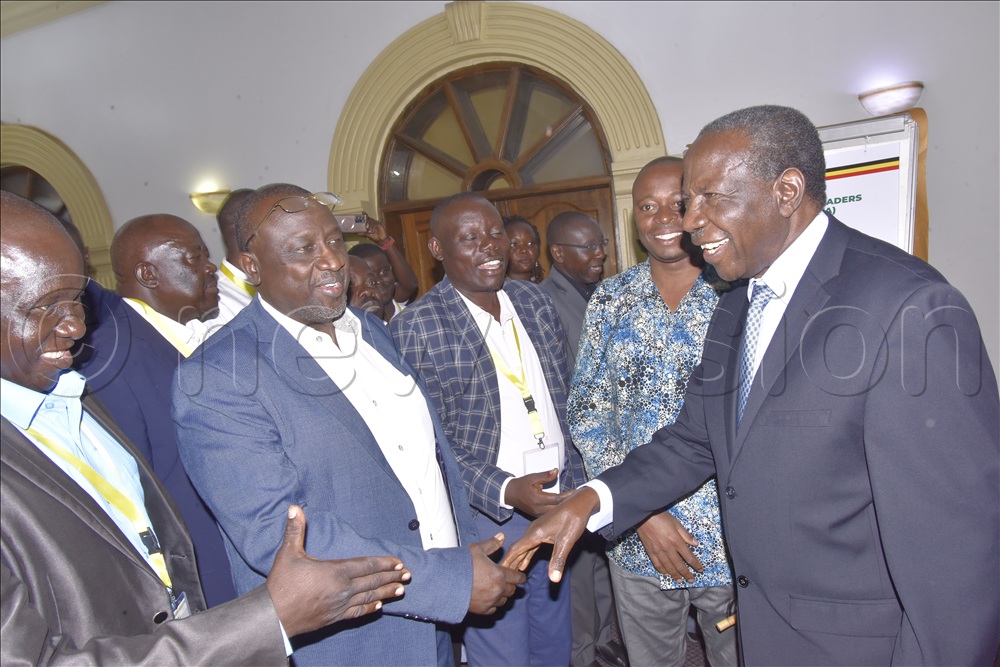Traders, stakeholders submit tax policy proposals for FY2026/27
The proposals, which have been submitted in response to a formal call for input from the Ministry, touch on a wide range of concerns from the Value Added Tax (VAT) threshold to the taxation of mobile phones, textiles, commercial real estate, and business registration services.
Thadeus Musoke, the chairperson of the National Entrepreneurs and Traders’ Association (NETA) (left), with the Commissioner General of URA, John Musinguzi, recently at URA offices during an engagement meeting aimed at understanding the tax administration concerns. (Photos by Moses Kigongo)
________________
Traders and other key stakeholders have started submitting tax policy proposals to the Ministry of Finance, Planning and Economic Development for consideration in the 2026/2027 national budget.
The proposals, which have been submitted in response to a formal call for input from the Ministry, touch on a wide range of concerns from the Value Added Tax (VAT) threshold to the taxation of mobile phones, textiles, commercial real estate, and business registration services.
One of the most prominent proposals is the call to raise the VAT registration threshold from the current sh150 million in annual turnover to at least sh500 million.
Traders argue that the current threshold is too low and imposes a heavy compliance burden on small and medium-sized enterprises.
In the textile sector, traders want a review of the tax assessment method.
Currently, textile imports are taxed based on weight (kilograms), but business leaders say this method is inappropriate and disproportionately affects their pricing and operations.
Thadeus Musoke, the chairperson of the National Entrepreneurs and Traders’ Association (NETA), urged the government to revise taxes on mobile phones, citing their essential role in business and daily life.
“Taxes on phones are too high, yet mobile phones are the primary platform for youth to do business online, search for jobs, study, pay school fees, and market their products,” Musoke said while submitting his tax proposals.
Finance Minister Matia Kasaija (right) with some of the members of the business community at Grand Imperial Hotel.
His sentiments were echoed by members of the United Arcades Traders’ and Entrepreneurs’ Association (UATEA), who noted that while some premium phones like iPhones can be taxed at higher rates, ordinary smartphones used by the majority of Ugandans should attract minimal tax to support the country’s digital transformation agenda.
Real estate sector raises alarm on commercial property taxes
Concerns were also raised by members of the Kampala City Traders Association (KACITA), particularly regarding taxation in the real estate sector.
Ken Nkuubi, a youth league leader in KACITA, called on the Ministry of Finance to reduce taxes on commercial properties, warning that escalating tax obligations may force many real estate investors out of business.
These concerns follow a recent directive by the Uganda Revenue Authority (URA) requiring all commercial buildings to adopt the Electronic Fiscal Receipting and Invoicing System (EFRIS).
The directive is aimed at improving transparency and curbing tax evasion through under-declared rental incomes. However, landlords and property managers have raised concerns over compliance costs and administrative burdens.
Call to review business formalisation costs
NETA members also raised concerns over what they described as high and numerous indirect charges imposed by the Uganda Registration Services Bureau (URSB). According to the traders, the agency charges between sh35,000 and sh40,000 for nearly every service ranging from business name reservation to certification.
“These fees make formalisation expensive. Some businesses end up spending over a million shillings just to complete the registration process,” one trader said, adding that the current system discourages informal businesses from transitioning into the formal economy.
Finance Ministry requests stakeholder input
The proposals come in response to a formal request from the Ministry of Finance, which recently wrote to various stakeholders, including the Private Sector Foundation Uganda (PSFU), the Commissioner General of URA, KACITA, the Governor of Bank of Uganda, Civil Society Budget Advocacy Group (CSBAG), and others, inviting tax policy proposals for the upcoming fiscal year.
In a communication signed by Patrick Ocailan, on behalf of the Permanent Secretary/Secretary to the Treasury, the Ministry explained that it reviews and updates tax policy proposals annually as part of preparations for the national budget.
“The Ministry is in the process of preparing tax policy proposals for the FY2026/27 Budget. Accordingly, stakeholders are requested to submit their issues of interest for review and compilation,” the statement read in part.
The Ministry noted that the proposals will inform stakeholder consultations aimed at identifying viable and inclusive tax policy reforms.
The deadline for submissions is October 10, 2025.